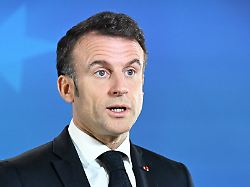Macron calls the Constitutional Council
Paris government threatens to collapse over immigration law
December 20, 2023, 1:07 p.m
Listen to article
This audio version was artificially generated. More info | Send feedback
After much hanging and choking, the French National Assembly passes a significantly stricter migration law. The consequences: President Macron has the constitutionality checked, there is malice from Le Pen and ministers threaten to resign.
French President Emmanuel Macron wants to have the constitutionality of an immigration law that has just been passed and is controversial within his camp examined. “The President will call the Constitutional Council and the Constitutional Council will say what happens,” Prime Minister Élisabeth Borne told the France Inter broadcaster in Paris. Macron himself wants to comment on the struggle over the law on television this evening.
Borne pointed out possible contradictions: “For example, if someone marries a Canadian or a Japanese who doesn’t speak French well, they can’t come to France. I don’t think it can stay that way.”
With the project, the government wants to better control immigration and improve integration. However, the adopted legal text is significantly more restrictive than originally intended. Regular migrants should only receive social benefits such as housing subsidies or family allowance later than before. Parliament is to debate annual immigration quotas. In addition, the crime of irregular residence, which was abolished under socialist President François Hollande in 2012, is to be reintroduced. Dual nationals who commit crimes against law enforcement officers should also lose their French nationality.
One of the core measures of the government’s project, according to which migrants who previously worked without residence documents in professions with a shortage of staff should be given a temporary residence permit, will only come in a significantly limited form.
Macron’s center camp has no longer had an absolute majority in the French National Assembly since the parliamentary elections in June 2022 and is therefore dependent on votes from the opposition for their projects. After the left-wing camp, the conservative Républicains and the right-wing National Rassemblement National rejected the legal text in the National Assembly last week before the plenary debate, the centrist government sought a compromise in a commission. To secure the Conservatives’ approval, she made significant concessions to them. Resistance then also came from within their own ranks.
Government members are considering resignation
The text that has now been adopted was drawn up within a few hours by the 14 members of a parliamentary mediation committee. President Emmanuel Macron used personal calls to pressure people to quickly find a compromise.
In the National Assembly, 349 members ultimately voted for the text and 186 voted against it. About a quarter of the government camp voted no. At least three government members from the left wing were considering resigning, ministry sources said. However, there can be no talk of a crisis in the government camp, explained Borne. The right-wing populist parliamentary group leader Marine Le Pen declared the law an “ideological victory” because it enshrined the “national priority”.
The French Constitutional Council, similar to the German Federal Constitutional Court, reviews laws and projects for their legality. If the Council examines a law for its constitutionality before it comes into force, the decision is made within thirty days, or in urgent cases within eight days. If Macron calls the Constitutional Council before Christmas, it should be clear in January whether he can bring the law into force in its current form or whether it needs to be improved.
